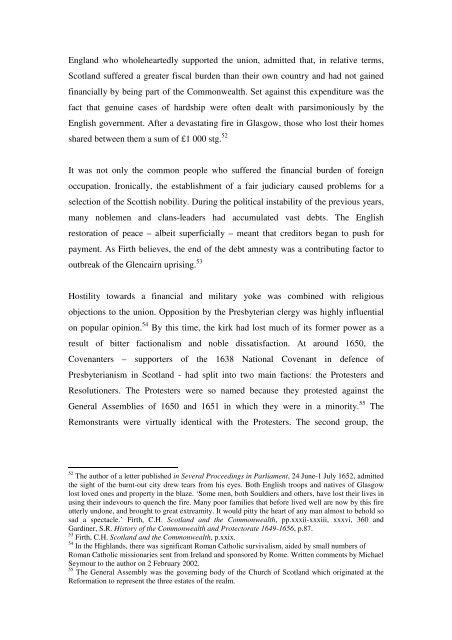The Glencairn Uprising, 1653-54 Helen Baker Department of ...
The Glencairn Uprising, 1653-54 Helen Baker Department of ...
The Glencairn Uprising, 1653-54 Helen Baker Department of ...
Create successful ePaper yourself
Turn your PDF publications into a flip-book with our unique Google optimized e-Paper software.
England who wholeheartedly supported the union, admitted that, in relative terms,<br />
Scotland suffered a greater fiscal burden than their own country and had not gained<br />
financially by being part <strong>of</strong> the Commonwealth. Set against this expenditure was the<br />
fact that genuine cases <strong>of</strong> hardship were <strong>of</strong>ten dealt with parsimoniously by the<br />
English government. After a devastating fire in Glasgow, those who lost their homes<br />
shared between them a sum <strong>of</strong> £1 000 stg. 52<br />
It was not only the common people who suffered the financial burden <strong>of</strong> foreign<br />
occupation. Ironically, the establishment <strong>of</strong> a fair judiciary caused problems for a<br />
selection <strong>of</strong> the Scottish nobility. During the political instability <strong>of</strong> the previous years,<br />
many noblemen and clans-leaders had accumulated vast debts. <strong>The</strong> English<br />
restoration <strong>of</strong> peace – albeit superficially – meant that creditors began to push for<br />
payment. As Firth believes, the end <strong>of</strong> the debt amnesty was a contributing factor to<br />
outbreak <strong>of</strong> the <strong>Glencairn</strong> uprising. 53<br />
Hostility towards a financial and military yoke was combined with religious<br />
objections to the union. Opposition by the Presbyterian clergy was highly influential<br />
on popular opinion. <strong>54</strong> By this time, the kirk had lost much <strong>of</strong> its former power as a<br />
result <strong>of</strong> bitter factionalism and noble dissatisfaction. At around 1650, the<br />
Covenanters – supporters <strong>of</strong> the 1638 National Covenant in defence <strong>of</strong><br />
Presbyterianism in Scotland - had split into two main factions: the Protesters and<br />
Resolutioners. <strong>The</strong> Protesters were so named because they protested against the<br />
General Assemblies <strong>of</strong> 1650 and 1651 in which they were in a minority. 55 <strong>The</strong><br />
Remonstrants were virtually identical with the Protesters. <strong>The</strong> second group, the<br />
52 <strong>The</strong> author <strong>of</strong> a letter published in Several Proceedings in Parliament, 24 June-1 July 1652, admitted<br />
the sight <strong>of</strong> the burnt-out city drew tears from his eyes. Both English troops and natives <strong>of</strong> Glasgow<br />
lost loved ones and property in the blaze. ‘Some men, both Souldiers and others, have lost their lives in<br />
using their indevours to quench the fire. Many poor families that before lived well are now by this fire<br />
utterly undone, and brought to great extreamity. It would pitty the heart <strong>of</strong> any man almost to behold so<br />
sad a spectacle.’ Firth, C.H. Scotland and the Commonwealth, pp.xxxii-xxxiii, xxxvi, 360 and<br />
Gardiner, S.R. History <strong>of</strong> the Commonwealth and Protectorate 1649-1656, p.87.<br />
53 Firth, C.H. Scotland and the Commonwealth, p.xxix.<br />
<strong>54</strong> In the Highlands, there was significant Roman Catholic survivalism, aided by small numbers <strong>of</strong><br />
Roman Catholic missionaries sent from Ireland and sponsored by Rome. Written comments by Michael<br />
Seymour to the author on 2 February 2002.<br />
55 <strong>The</strong> General Assembly was the governing body <strong>of</strong> the Church <strong>of</strong> Scotland which originated at the<br />
Reformation to represent the three estates <strong>of</strong> the realm.
















